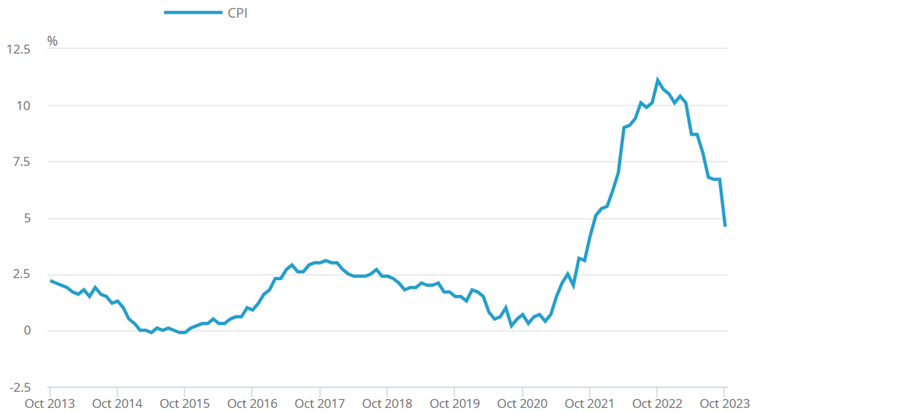
Reflections on 2023 and a look ahead to the economy in 2024
1.02.20242023 was dominated by the continued cost of living crisis, with millions of UK households affected by high inflation and the government’s stealth taxes. Interest rates, meanwhile, have increased steadily, adding to the woe for homeowners.
With conflict continuing in Ukraine, the Israel-Hamas war has caused further global uncertainty. The year ended with Cop28, as world leaders continued their attempts to get to grips with the climate crisis.
Keep reading for your look at the key events that shaped the economy in 2023 and the financial forecast for 2024.
Inflation and interest rates dominated financial headlines in 2023
Inflation
UK inflation stood at 10.4% back in February but has been steadily falling ever since. The Consumer Prices Index (CPI) reached 4.6% for the 12 months to October 2023.

This is good news for consumers and UK households struggling with the rising cost of living but the Bank of England (BoE) has struck a cautious note.
In November, BoE governor Andrew Bailey told MPs that inflation is on track to fall back to the central bank’s 2% target. The Monetary Policy Committee (MPC) expects inflation to reach 2% by the end of 2025.
Bailey commented that the fall was “obviously good news” but warned financial markets not to get carried away and to be wary of underestimating the difficulty of the road ahead.
Two risks remain. One is that UK inflation remains high. It’s important to remember that 4.6% is still more than double the BoE’s 2% target. The fall represents prices rising less quickly, rather than prices falling.
The other factor Bailey quoted, and one to watch in 2024, is that the conflict in the Middle East leads to rising oil prices which could have a significant impact on UK inflation and the global economy.
Interest rates
One of the main tools the BoE uses in an attempt to control inflation is the base rate. Its MPC continued to increase interest rates this year.
From just 0.1% in December 2021, the committee voted to raise the rate at 14 consecutive meetings until it peaked at 5.25% in September 2023. It has since remained at this figure, leading to Times Money Mentor recently suggesting that rates might have peaked. The report quotes several experts who predict a fall to 4% by the end of 2024, and 3% by the end of 2025.
What will be of most interest to consumers in 2024 is whether the rate rises will be passed on by high street banks, and how these rates will continue to affect the cost of borrowing.
Financial Conduct Authority (FCA) figures from earlier in the year suggest that only 28% of the base rate has been passed on. The effect of base rate rises on the economy is also expected to be delayed, possibly by 12 months or more. The Office for Budget Responsibility (OBR) states that half the impact is yet to be felt.
OBR forecasts and the Autumn Statement
On 22 November, Jeremy Hunt delivered his Autumn Statement, alongside OBR forecasts updated from March 2023. The forecasts proved difficult viewing with many downgrades from earlier in the year.
While GDP is expected to rise by 0.6% (compared to a previously forecast dip of 0.2%), growth in 2024 and 2025 is now expected to be more muted. Growth could reach 1.4% in 2025 compared to the 2.5% predicted in March.
Inflation and interest rates are both expected to stay higher for longer.
Expect stealth taxes to continue to raise money for the Treasury while squeezing personal finances into 2024 and beyond.
Freezes on the Personal Allowance are expected to push 4 million more Brits into the lowest Income Tax band, with 3 million more moving into the higher rate, and an extra 400,000 becoming additional-rate taxpayers. Inheritance Tax (IHT) threshold freezes will also cost Brits in the next four years as increasing house prices, among other factors, cause Treasury IHT receipts to rise.
Staying focused on your long-term goals will be key
With fiscal drag expected to affect UK finances over the next few years and a recession far from out of the question in 2024, remaining patient will be key.
We can help you ignore the noise and stay focused on your long-term investment goals, providing confidence and peace of mind, whatever 2024 brings. To learn more about how our financial planners can help you, email us at advise-me@fosterdenovo.com, call us on 0330 332 7866, or book a meeting.
Please note
The value of your investments (and any income from them) can go down as well as up and you may not get back the full amount you invested. Past performance is not a reliable indicator of future performance. Investments should be considered over the longer term and should fit in with your overall attitude to risk and financial circumstances.
Sources:
https://www.ons.gov.uk/economy/inflationandpriceindices/bulletins/consumerpriceinflation/october2023, https://www.bankofengland.co.uk/monetary-policy-summary-and-minutes/2023/december-2023,
https://www.thetimes.co.uk/money-mentor/mortgage-property/when-will-interest-rates-go-down-uk, https://www.fca.org.uk/publication/multi-firm-reviews/cash-savings-market-review-2023.pdf
https://obr.uk/efo/economic-and-fiscal-outlook-november-2023/

 0330 332 7866
0330 332 7866 advise-me@fosterdenovo.com
advise-me@fosterdenovo.com Search
Search






